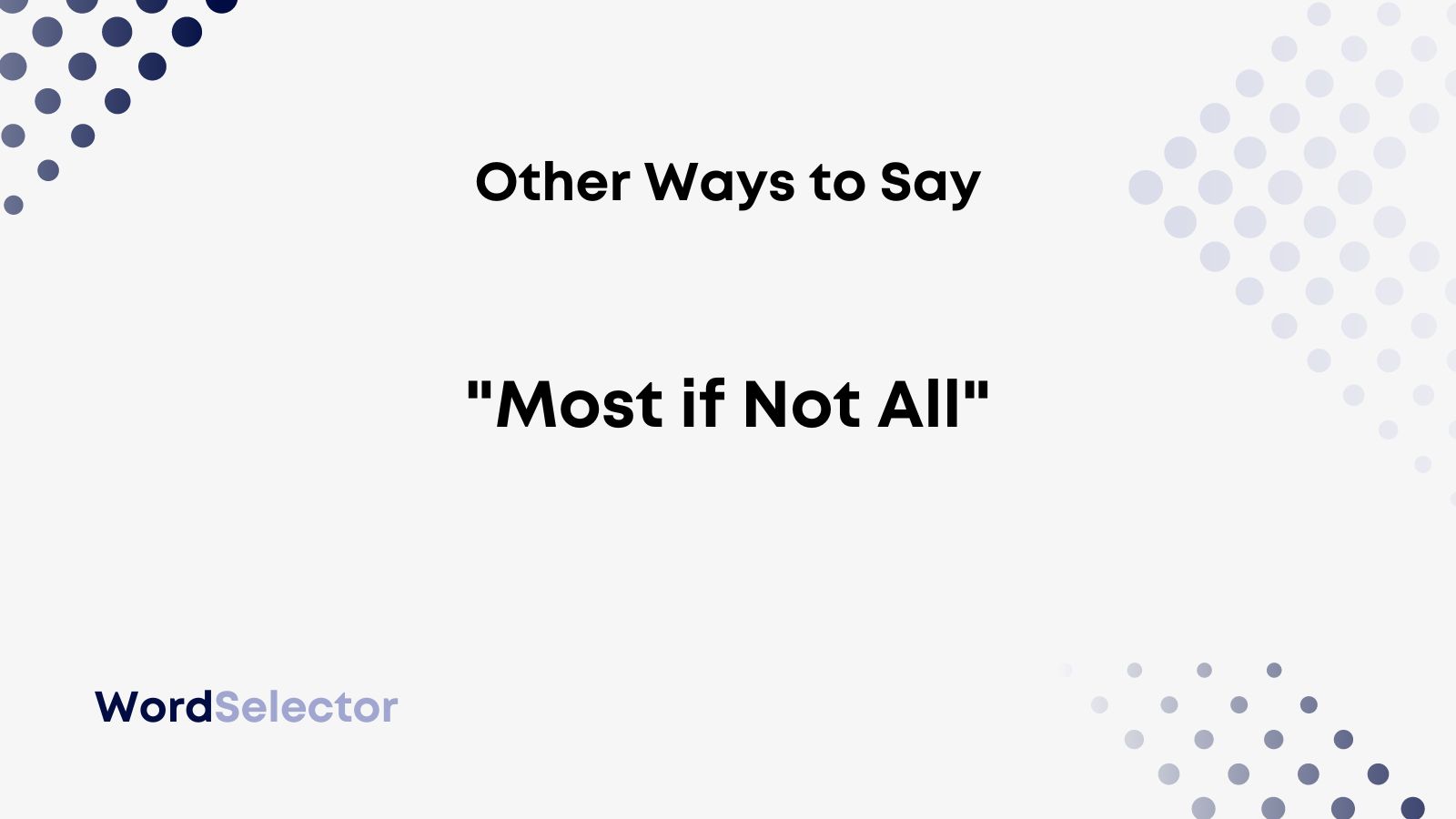Are you trying to figure out how to talk about most items or entities, perhaps even all of them?
Maybe you’re worried that “most, if not all” is a bit informal or insincere.
Fear not! You have other options!
This article will teach you how to say “most, if not all” professionally and informally, depending on your needs.
Other Ways to Say “Most if Not All”
- The vast majority
- Essentially everyone
- Practically all
- Nearly everybody
- Virtually everyone
- Almost every subject
- All or nearly all
- Almost without exception
- Predominantly
- For the most part
- By and large
- In general
- In the main
- On the whole
KEY TAKEAWAYS
- “Most, if not all” is correct to use when describing a large group of people or items.
- “The vast majority” works well as a formal synonym if you’re trying to mix things up.
- “Essentially everyone” is great as a more informal phrase if that works better for your writing.
So, keep reading to learn other ways to say “most, if not all.” We’ve explained more regarding the best formal and informal options to show you how they might work.
You can also read the last section to find out if the phrase is correct. Then, you’ll know whether it’s something you can include in your writing moving forward.
The Vast Majority (Formal)
Another way to say “most, if not all” is “the vast majority.” This is a more formal synonym to help with your emails or academic writing.
Notice how it doesn’t mention “if not all,” though. This is generally because the inclusion of “if not all” makes the phrase less formal overall.
Instead, “the vast majority” simply refers to a large, unspecified group of things.
Therefore, it remains professional. It also leaves the number up to the reader’s imagination.
You could use it when talking to clients about people’s interest in your company. It might be a good way to get them involved if they know a lot of people are excited about upcoming projects.
Feel free to review these email samples to learn a bit more about it:
Dear Ms. Firth,
The vast majority of our clients agree that this is the right step to take.
Please let me know if you’ll be happy for us to provide more details.
All the best,
Zoe Clarkson
Dear Mr. Tanner,
It goes without saying that the vast majority are looking forward to this.
Hopefully, you’ll join that majority soon and be ready for what’s to come.
Best regards,
Dan Evans
Essentially Everyone (Informal)
For something a bit more informal, you can write “essentially everyone.”
This is a great way to sound friendly and casual when describing a large group of people.
Using “essentially” also implies that not everyone is included. However, most people are!
Therefore, you can use this when writing to employees. It suggests that a lot of their peers want to get involved with something, and you’re trying to entice them to join the fun.
Check out the following email sample if you still need help understanding it:
Hey Bethany,
Essentially everyone has already signed up for this event!
I certainly hope I’ll have your name down on this list by the end of the week!
Best regards,
Sarah Catford
It might also be good to use this when texting friends. This could be a good option that allows you to include most of your friend group in a list without assuming everyone agrees.
So, check out this message sample to learn a bit more:
I’m sure that essentially everyone will be happy to do something like this! It sounds like a lot of fun, after all.
Is It Correct to Say “Most if Not All”?
It is correct to say “most, if not all.” It’s a great way to refer to a large group of people or items without specifying how many are included.
Generally, you can’t use it in emails, though. After all, it’s not the most professional phrase.
Still, you can refer to this example to learn how to use “most, if not all” in a sentence:
Most, if not all, of my friends think I’m going to win this! I’m not entirely sure if I believe them, though.
However, before using the phrase, you have to understand the comma rules!
You should always place “if not all” inside commas. For example:
- Correct: Most, if not all, of you were there.
- Incorrect: Most if not all of them came.
As you can see, you must enclose “if not all” in commas. After all, you could remove it from the phrase, and it would still make sense:
- Most of you were there.
Before you go, ensure you bookmark this page! Then, you can come back and remind yourself of the best synonyms for “most, if not all” when you need to mix things up in your writing.

